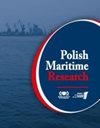基于比例模型加速阶段拖曳试验的船舶能量需求预测
IF 2
3区 工程技术
Q2 ENGINEERING, MARINE
引用次数: 0
摘要
摘要海军建筑师最关键的任务之一是计算满足舰艇作战需求所需的能量。在预测船舶的能量需求时,在定速阶段对比例模型船舶进行一系列船体阻力测试,而忽略加速度阶段的测量。耐波性分析中的另一个重要因素是船舶的水动力附加质量。动力学第二定律指出,所有这些有价值的信息,即船体阻力对船舶速度和附加质量的依赖性,只需在最大速度下进行一次加速级拖曳试验即可获得。因此,在传统的拖曳实验中经常被忽视的加速阶段可能是一个有价值的信息来源。因此,本工作旨在将Froude的缩放程序推广到用于加速阶段拖曳试验的全尺寸船舶。本文章由计算机程序翻译,如有差异,请以英文原文为准。
Vessel Energy Requirement Prediction from Acceleration Stage Towing Tests on Scale Models
Abstract One of the most crucial tasks for naval architects is computing the energy required to meet the ship’s operational needs. When predicting a ship’s energy requirements, a series of hull resistance tests on a scale model vessel is carried out in constant speed stages, while the acceleration stage measurements are ignored. Another important factor in seakeeping analysis is the ship’s hydrodynamic added mass. The second law of dynamics states that all this valuable information, that is, the dependence of the hull resistance on the vessel’s speed and the added mass, is accessible from just one acceleration stage towing test done up to the maximum speed. Therefore, the acceleration stage, often overlooked in traditional towing experiments, can be a valuable source of information. For this reason, this work aims to generalise Froude’s scaling procedure to full-scale vessels for the accelerated stage towing tests.
求助全文
通过发布文献求助,成功后即可免费获取论文全文。
去求助
来源期刊

Polish Maritime Research
工程技术-工程:海洋
CiteScore
3.70
自引率
45.00%
发文量
20
审稿时长
>12 weeks
期刊介绍:
The scope of the journal covers selected issues related to all phases of product lifecycle and corresponding technologies for offshore floating and fixed structures and their components.
All researchers are invited to submit their original papers for peer review and publications related to methods of the design; production and manufacturing; maintenance and operational processes of such technical items as:
all types of vessels and their equipment,
fixed and floating offshore units and their components,
autonomous underwater vehicle (AUV) and remotely operated vehicle (ROV).
We welcome submissions from these fields in the following technical topics:
ship hydrodynamics: buoyancy and stability; ship resistance and propulsion, etc.,
structural integrity of ship and offshore unit structures: materials; welding; fatigue and fracture, etc.,
marine equipment: ship and offshore unit power plants: overboarding equipment; etc.
 求助内容:
求助内容: 应助结果提醒方式:
应助结果提醒方式:


